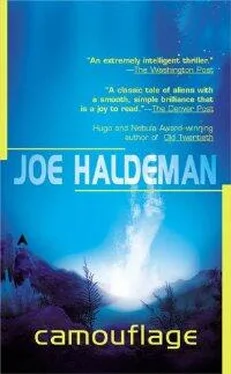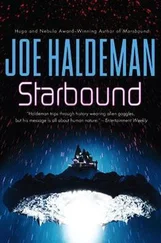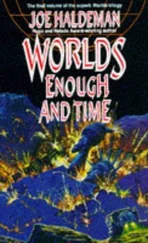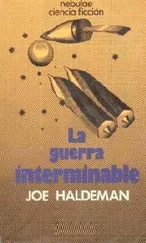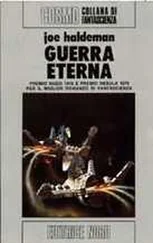A Japanese truck—a Chevrolet—full of soldiers rumbled by, and one of them did a trick he evidently had been practicing. He dropped a lasso around one of the marchers, intending to drag him along. But he chose the man who was next to the changeling. Crashing to his knees, he cried out, and the changeling automatically snatched at the rope and gave it a jerk, which pulled the Japanese cowboy suddenly off the truck. He hit the ground hard, and the others on the truck started yelling.
Everybody stopped for a few seconds while the soldiers checked their fallen cowboy comrade, whose face was a flag of blood when he shakily stood up. He pointed at the changeling and shouted, gesticulating.
An officer walked back to where it was standing. He was marginally neater and cleaner than the others, and carried a sword of rank.
He looked at the changeling’s face for a long time, and said a few quiet words. Then he turned on his heel and walked off the road. Two guards took the changeling by the arms and followed. Others began yelling at the standing crowd, trying to get them moving again. There was some shouting from the Americans, but a rifle shot silenced them, and the changeling could hear the crowd shuffling on.
When they’d taken it a couple of hundred meters, they stopped, and one of the guards threw a shovel at the changeling’s feet. “You must dig your grave,” the officer said.
This was interesting. “No,” the changeling said to him. “Make the one with the rope dig it.”
The officer laughed, and said something in Japanese. The guards laughed, too, but then there was an awkward silence, and the officer whispered two syllables. The one with the bloody face began to dig, obviously stiff with pain. They tied the changeling’s hands together.
It was a shallow grave, little more than a foot deep, and barely long enough for its six-foot frame.
“Kneel,” the officer said, and someone kicked the changeling behind the knee. It heard the blade swishing down and felt a hard blow at the base of its neck, not as painful as changing bodies, and then another blow.
The world spun around, sky twice. The changeling’s head came to ground face up, and it watched with interest as its upside-down body spouted blood, and then fell or was pushed into the grave. It couldn’t see after that, but heard and felt the warm dusty soil being shoveled over it.
Apia, Samoa, 24 December 2020
Everybody wanted to be “there” when the laser was first used, but of course there wasn’t room in the lab itself, which for this phase of the research didn’t look much like a lab. The laser was basically a government-gray metal box the size of a pickup truck, squatting in the jury-rigged extension they’d welded on to the environmental containment vessel. Its barrel, a glass cylinder, was aligned with the taped-off four-by-four-inch square on the artifact’s side, looking up at about a 30-degree angle. In the ceiling was an oval of optical glass that should be perfectly transparent to the laser’s frequency. Better be. If it absorbed a hundredth of one percent it would melt.
The entrance side of the lab had been turned into a bunker, steel plate fronting concrete blocks. Three technicians were crowded in there, scrutinizing data feeds and watching the experiment over a video monitor.
Everybody else was watching a wide-screen monitor in fale 7, which was also crowded, with twenty-one people standing or sitting, attention riveted on the screen.
“Sixty seconds,” the screen said, unnecessarily, the digital countdown rolling away in the lower right-hand corner.
Jan was seated between Russ and Jack, front row center. “Now we’ll see,” she said.
“Won’t see a damn thing,” Jack said.
“Bet you a beer,” Russ said.
“On a measurable physical change? You’re on.”
Nobody said anything more as the countdown rolled to zero. Then the laser hummed, and there was a pale visible ray between the barrel and the target area, as its ferocious power ionized the air. The tape vanished in a puff of smoke.
Nothing obvious was happening to the artifact. “Should’ve held out for an imported beer,” Jack said.
“Temperature’s up,” a technician said from the screen. “All over the artifact. Every sensor shows about a degree Celsius increase.”
“I’ll take a Valima,” Russ said.
“How about the ambient temperature?” Jack asked the screen.
“Also up a degree, Dr. Halliburton. To twenty-one degrees.”
“So no deal. It always matches the ambient temperature.”
“Quibble, quibble,” Russ said. “Still a measurable physical change.”
“I think you should split a beer,” Jan said, “and play nice.”
Jack nodded absently. “Try full power?”
“Twenty percent,” Russ said quickly. “We don’t want full power with air in the room.”
“Okay. Naomi,” he said to the screen, “let’s crank the laser up to twenty percent.”
“Done.” There was no visible change. After a minute she said, “Temperature’s up another degree.”
“Let’s turn it off and examine the artifact,” Russ said.
Jack was staring at the spot where the laser was concentrating enough power to melt through thick steel, hoping for a wisp of smoke, anything. “Oh … all right.”
Naomi and Moishe Rosse, Jan’s senior technician, went from the bunker into the slightly less confined “artifact room.” They spent a couple of hours sending data back to the people in number 7: visual, electron, and positron. The air in the room showed an unsurprising increase in ozone and oxides of nitrogen.
Nothing important had changed.
“Let’s go ahead and evacuate the room,” Russ said, “and repeat the ten and twenty percent exposures. With no air in the room, any temperature increase in the artifact is going to be straight radiative transfer from the laser.”
“We ought to crank it up to fifty percent,” Jack said.
“If there’s no change.” Russ looked at Jan. “Okay?”
She nodded. “How long to evacuate the room?”
Greg Fulvia spoke up. “We figure about four hours to 0.1 millibar.”
“We ought to check the laser periodically as the pressure goes down,” Moishe said from the screen. “It’s designed to work in a vacuum, but that’s after sitting in orbit for a long time.”
“What do you expect?” Russ asked.
“I don’t know. I expect machines to malfunction when you change their operating environment.”
“Do a system check every hour or so, then,” Jack said. “The sensors, too, and microscopes. The positron’s kind of a delicate puppy.”
Russ looked at his watch; it was almost noon. “Let’s all be back here at 1700. Who do you need, Greg?”
“It’s all set up. I’ll flick the switch and Tom and I can take turns looking at the nanometer.” He talked to the screen. “You guys let us know when you’re battened down.” Moishe said to give them ten minutes.
“Sails?” Russ said, a restaurant on the harbor. He and Jan rode bicycles over, and got drenched in a one-minute downpour. Jack was waiting for them at a balcony table.
“Nice cab ride?” Jan asked, rubbing a bandana through her ruff of white hair.
“Bumpy as hell.” He pushed a bottle of red wine an inch in their direction. “I took the liberty.”
“A glass, anyhow.” She poured for herself and Russ, and they sat down heavily, simultaneously. “Not a cloud in the sky.”
“Bicycling causes rain,” Jack said. “Scientific fact.”
“Glad there’s some science today,” Russ said. The waiter came up and they all ordered without looking at the menu.
“Every time we stress it without leaving a mark is a little science.” She took a sip. “It’s our technology versus theirs, or what theirs was a million years ago.”
Читать дальше
